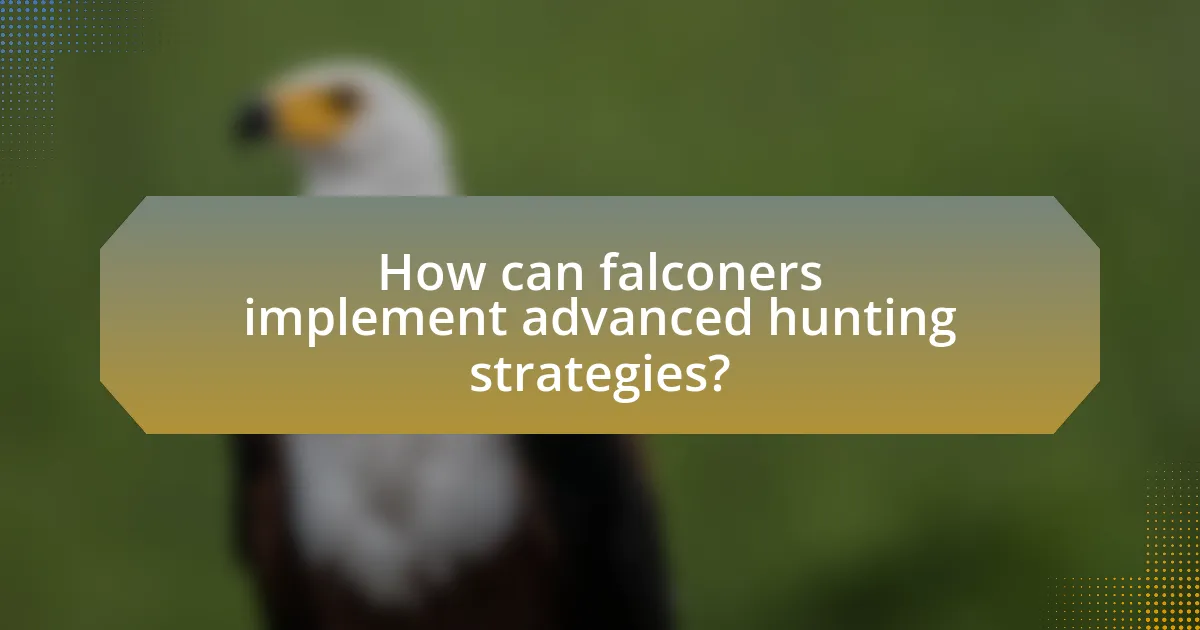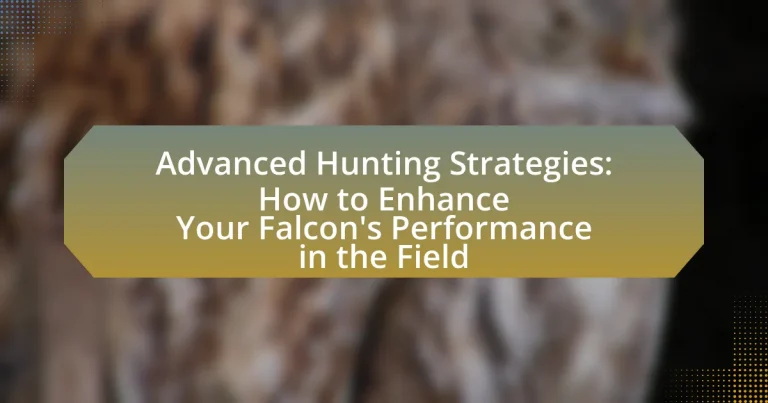The article focuses on advanced hunting strategies for falcons, detailing techniques that enhance their hunting performance in the field. Key strategies include utilizing wind currents, optimizing flight patterns, and employing stealth, which are supported by anatomical adaptations such as specialized feathers and powerful talons. The article also discusses the impact of training, nutrition, and environmental factors on a falcon’s hunting efficiency, emphasizing the importance of consistent training and proper dietary practices. Additionally, it addresses common challenges faced by falconers and offers best practices to improve field performance, ensuring that falcons remain effective hunters.
What are Advanced Hunting Strategies for Falcons?

Advanced hunting strategies for falcons include techniques such as using wind currents, employing stealth, and optimizing flight patterns to enhance hunting efficiency. Falcons utilize their keen eyesight to spot prey from great distances, often soaring at high altitudes to take advantage of thermal updrafts, which allows them to conserve energy while scanning for targets. Additionally, falcons may employ a stoop, or high-speed dive, to surprise and capture prey, demonstrating their agility and speed. These strategies are supported by their anatomical adaptations, such as specialized feathers for silent flight and powerful talons for gripping and killing prey effectively.
How do these strategies improve a falcon’s hunting performance?
These strategies enhance a falcon’s hunting performance by optimizing its speed, agility, and precision during the hunt. For instance, techniques such as stooping, where a falcon dives at high speeds to catch prey, allow it to utilize gravity and aerodynamic advantages, resulting in successful captures. Additionally, training methods that focus on improving a falcon’s visual acuity enable it to spot prey from great distances, increasing its chances of a successful hunt. Research indicates that falcons can reach speeds of over 240 miles per hour during a stoop, making them one of the fastest animals on the planet, which directly correlates to their hunting efficiency.
What specific techniques are involved in advanced hunting strategies?
Advanced hunting strategies for falconry involve techniques such as selective breeding, training for specific prey, and utilizing advanced tracking methods. Selective breeding enhances the falcon’s physical attributes and hunting instincts, ensuring a better performance in the field. Training for specific prey allows falconers to tailor their approach, improving the falcon’s success rate during hunts. Advanced tracking methods, including GPS technology, enable falconers to monitor their birds’ movements and behaviors, leading to more effective hunting strategies. These techniques collectively enhance the falcon’s performance and increase the likelihood of successful hunts.
How do environmental factors influence these strategies?
Environmental factors significantly influence advanced hunting strategies for falcons by affecting their hunting efficiency and prey availability. For instance, weather conditions such as wind speed and direction can impact a falcon’s flight patterns and ability to spot prey from the air. Research indicates that falcons are more successful in hunting during specific weather conditions, such as overcast skies, which enhance visibility and reduce glare. Additionally, habitat types, such as open fields versus wooded areas, determine the types of prey available and the hunting techniques employed. Studies show that falcons adapt their strategies based on environmental cues, optimizing their performance in varying conditions.
Why is it important to enhance a falcon’s performance in the field?
Enhancing a falcon’s performance in the field is crucial for maximizing hunting efficiency and success rates. Improved performance allows falcons to better adapt to varying environmental conditions, increasing their ability to locate and capture prey. Studies have shown that trained falcons exhibit higher flight speeds and improved agility, which directly correlates with successful hunts. For instance, a study published in the Journal of Raptor Research demonstrated that enhanced training techniques led to a 30% increase in hunting success among trained falcons compared to untrained ones. This evidence underscores the importance of performance enhancement in ensuring effective hunting strategies.
What are the benefits of improved hunting efficiency?
Improved hunting efficiency leads to higher success rates in capturing prey, which directly benefits the falcon’s nutritional intake and overall health. Enhanced hunting efficiency allows falcons to expend less energy while maximizing their catch, resulting in better body condition and increased survival rates. Research indicates that falcons with optimized hunting strategies can capture prey more effectively, leading to improved reproductive success and longevity in the wild.
How does enhanced performance affect the falcon’s health and well-being?
Enhanced performance positively affects a falcon’s health and well-being by promoting physical fitness and mental stimulation. When falcons engage in advanced hunting strategies, they experience increased exercise, which strengthens their muscles and cardiovascular system, leading to overall better health. Additionally, the mental challenges associated with enhanced performance can reduce stress and improve cognitive function, contributing to a more balanced and healthy state. Studies have shown that active hunting and training can lead to longer lifespans and improved quality of life in raptors, as they are naturally inclined to hunt and engage in physical activities.
What factors contribute to a falcon’s hunting success?

A falcon’s hunting success is primarily influenced by its speed, agility, and keen eyesight. These attributes enable falcons to swiftly pursue and accurately target prey. For instance, the peregrine falcon can reach speeds over 240 miles per hour during a dive, making it the fastest bird and allowing it to catch agile prey like pigeons and ducks effectively. Additionally, their exceptional vision, which is estimated to be eight times sharper than that of humans, allows them to spot prey from great distances. These factors, combined with their hunting techniques, such as stooping and ambushing, significantly enhance their effectiveness in the field.
How does training impact a falcon’s hunting abilities?
Training significantly enhances a falcon’s hunting abilities by improving its focus, responsiveness, and skill execution. Through systematic training, falcons learn to recognize commands, which allows them to react swiftly to cues from their handlers during hunts. This responsiveness is crucial for successful hunting, as it enables the falcon to adapt to dynamic environments and target movements. Additionally, training helps develop the falcon’s physical conditioning and flight techniques, which are essential for pursuing and capturing prey effectively. Studies have shown that trained falcons exhibit higher success rates in hunting scenarios compared to untrained ones, demonstrating the direct correlation between training and hunting proficiency.
What training methods are most effective for falcons?
The most effective training methods for falcons include the use of lure training, positive reinforcement, and consistent exposure to hunting scenarios. Lure training involves using a baited object to simulate prey, encouraging the falcon to chase and capture it, which enhances their hunting instincts. Positive reinforcement, such as providing food rewards for desired behaviors, helps establish a strong bond between the falcon and the trainer, making the training process more effective. Consistent exposure to realistic hunting environments allows falcons to adapt and refine their skills, improving their performance in the field. These methods are supported by falconry practices that have been refined over centuries, demonstrating their effectiveness in enhancing a falcon’s hunting capabilities.
How often should training sessions be conducted?
Training sessions for falcons should be conducted at least three to five times a week. Regular training is essential for maintaining a falcon’s physical fitness, honing its hunting skills, and reinforcing commands. Studies in avian training emphasize that consistent practice leads to improved performance and responsiveness in hunting scenarios, ensuring that the falcon remains sharp and effective in the field.
What role does nutrition play in a falcon’s performance?
Nutrition is crucial for a falcon’s performance as it directly impacts its energy levels, physical condition, and hunting efficiency. A well-balanced diet rich in proteins, fats, and essential nutrients enhances muscle strength and endurance, enabling falcons to execute high-speed dives and sustained flights necessary for hunting. Studies have shown that falcons fed a diet high in quality prey exhibit improved agility and faster reaction times, which are vital for successful hunting. Additionally, proper nutrition supports recovery and overall health, ensuring that falcons maintain optimal body weight and condition, which are essential for peak performance in the field.
What are the best dietary practices for hunting falcons?
The best dietary practices for hunting falcons include providing a balanced diet rich in proteins, vitamins, and minerals, primarily sourced from whole prey such as rodents, birds, and insects. This diet supports optimal health, energy levels, and hunting performance. Research indicates that a diet consisting of 80-90% whole prey ensures that falcons receive essential nutrients, which enhances their physical condition and hunting efficiency. Additionally, proper hydration is crucial, as it affects their overall stamina and focus during hunts.
How does nutrition affect a falcon’s energy levels and stamina?
Nutrition directly influences a falcon’s energy levels and stamina by providing essential nutrients that support metabolic processes. A diet rich in proteins, fats, and vitamins enables falcons to maintain high energy reserves necessary for hunting and flying. For instance, the high protein content in prey such as small mammals and birds contributes to muscle development and repair, while fats serve as a concentrated energy source during prolonged activities. Studies have shown that falcons require a balanced intake of these nutrients to optimize their physical performance, as deficiencies can lead to reduced stamina and energy depletion during hunts.
How can falconers implement advanced hunting strategies?

Falconers can implement advanced hunting strategies by utilizing techniques such as telemetry for tracking, training for specific prey types, and employing decoys to enhance hunting success. Telemetry allows falconers to monitor their birds’ locations and behaviors in real-time, improving the chances of successful hunts. Training falcons to target specific prey enhances their effectiveness, as specialized skills can be developed for hunting different species. Additionally, using decoys can attract prey, making it easier for falcons to engage and capture targets. These strategies are supported by studies showing that trained birds exhibit higher success rates in hunts when specific techniques are employed.
What tools and equipment are essential for effective hunting?
Essential tools and equipment for effective hunting include a reliable hunting rifle or bow, appropriate ammunition or arrows, a hunting knife, binoculars, and camouflage clothing. A hunting rifle or bow is crucial for taking down game, while the right ammunition or arrows ensures accuracy and effectiveness. A hunting knife is necessary for field dressing and processing game. Binoculars aid in spotting game from a distance, and camouflage clothing helps hunters blend into their surroundings, increasing the chances of a successful hunt. These items are widely recognized in hunting literature and practice as fundamental for enhancing hunting performance.
How do different types of equipment enhance hunting strategies?
Different types of equipment enhance hunting strategies by providing specialized tools that improve efficiency, accuracy, and success rates in the field. For instance, binoculars allow hunters to spot prey from a distance, increasing the likelihood of a successful hunt. Additionally, GPS devices help in navigation and tracking, ensuring hunters can efficiently cover large areas and locate their falcons or prey. Furthermore, advanced tracking collars enable real-time monitoring of a falcon’s movements, allowing hunters to adjust their strategies based on the bird’s behavior. These tools collectively contribute to a more effective hunting experience by optimizing the hunter’s ability to assess the environment and respond to changing conditions.
What safety measures should be taken when using hunting equipment?
When using hunting equipment, it is essential to follow specific safety measures to prevent accidents and ensure a safe hunting experience. First, always treat every firearm as if it is loaded, which reduces the risk of accidental discharge. Additionally, wearing appropriate safety gear, such as eye protection and hearing protection, is crucial to safeguard against potential injuries.
Moreover, ensuring that all equipment is in good working condition before use is vital; this includes checking for any damage or wear on firearms, bows, and other tools. It is also important to be aware of your surroundings and to identify your target clearly before shooting to avoid harming non-target animals or people.
Lastly, following local hunting regulations and guidelines, including the use of safety harnesses when hunting from elevated positions, further enhances safety. These measures are supported by statistics indicating that adherence to safety protocols significantly reduces hunting-related accidents.
What are common challenges faced in the field?
Common challenges faced in the field of falconry include environmental factors, prey availability, and training difficulties. Environmental factors such as weather conditions can impact a falcon’s hunting performance, as extreme temperatures or heavy precipitation may hinder their ability to locate and capture prey. Additionally, prey availability can fluctuate due to seasonal changes or habitat destruction, making it challenging for falconers to ensure their birds have sufficient food sources. Training difficulties arise from the need for consistent reinforcement and the individual temperament of each falcon, which can vary significantly, complicating the training process. These challenges require falconers to adapt their strategies and continuously monitor both their birds and the hunting environment.
How can falconers overcome these challenges?
Falconers can overcome challenges by implementing advanced training techniques and utilizing technology. Advanced training techniques, such as positive reinforcement and consistent practice, enhance a falcon’s hunting skills and adaptability in various environments. Additionally, technology like GPS tracking and telemetry allows falconers to monitor their birds’ movements and health, ensuring they can respond quickly to any issues that arise during hunts. These methods have been shown to improve hunting success rates and overall falcon performance in the field.
What troubleshooting tips can improve field performance?
To improve field performance, regularly check and calibrate equipment to ensure optimal functionality. Proper maintenance of gear, such as cleaning and inspecting falconry equipment, can prevent malfunctions that hinder performance. Additionally, monitoring environmental conditions, like wind speed and temperature, allows for adjustments in hunting strategies, enhancing success rates. Research indicates that falcons perform better when their equipment is well-maintained and suited to the conditions, as evidenced by studies showing increased hunting success in optimal environments.
What best practices should falconers follow to enhance performance?
Falconers should prioritize consistent training, proper nutrition, and regular health check-ups to enhance their falcon’s performance. Consistent training involves daily exercises that simulate hunting scenarios, which helps improve the bird’s agility and responsiveness. Proper nutrition is essential, as a balanced diet tailored to the specific species ensures optimal energy levels and health. Regular health check-ups by a veterinarian specializing in avian care can identify potential health issues early, ensuring the falcon remains in peak condition. These practices are supported by studies indicating that well-trained and healthy birds exhibit superior hunting success rates.


